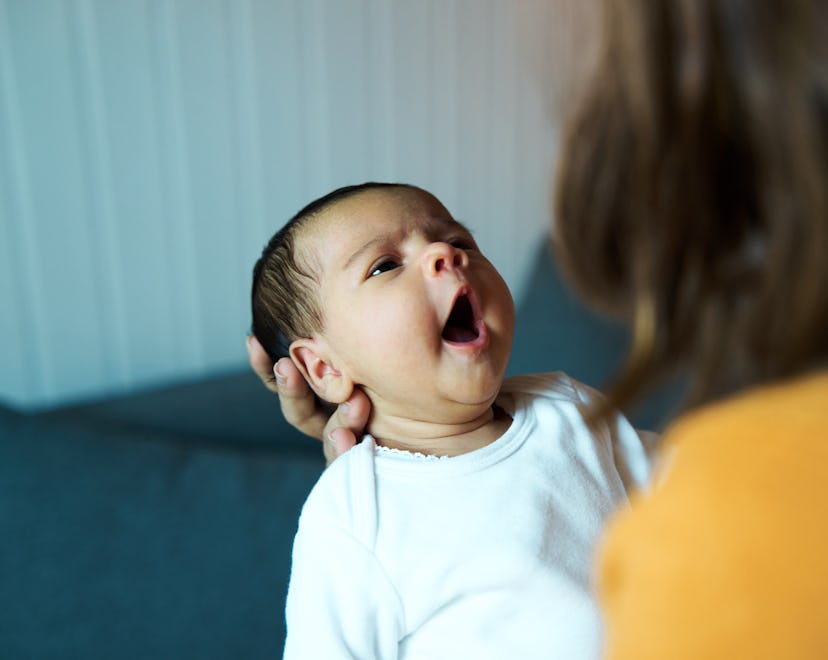Sleep Safety

Even If Your Baby Sleeps Better in Your Bed, It’s Still Not Recommended
It’s just not worth the risk, experts say.
Before your baby arrives, you obsess over the kind of crib, bassinet, or co-sleeper to purchase. Then you get home from the hospital and you realize that newborns aren’t huge fans of cribs. Or is it just that newborn babies don’t know the difference between days and nights yet? Or is it that they’re small and need to eat around the clock? All you know for sure is that you’re exhausted and you’ll try anything. Somewhere in there, we’ve probably all asked ourselves ‘will my baby sleep better in my bed?’ The thing is, even if they might sleep slightly longer — and the jury is out on that one — bed-sharing is not worth the risk.
Why does my baby sleep better in my bed?
First of all, it has to be said that the American Academy of Pediatrics recommends room-sharing, but not bed-sharing with infants for the first six months of life. As to why some parents wonder if their baby would sleep better in a co-sleeping situation, well, that’s a thorny question. “It's a really tricky area because, there's no doubt that sharing a sleep surface with a baby does confer a risk of accidental suffocation,” says Dr. Craig Canapari, directer of the Yale Pediatric Sleep Center, referring to the correlation between bed-sharing and sleep-related deaths in infants. “Certainly it [bed-sharing] provides comfort to parent and child, but it's such a loaded subject. I think it's difficult to discuss because we’re talking about a damaging consequence that's incredibly rare, but the worst thing you can imagine.” In other words? Even if your baby might sleep slightly better or longer — and that is questionable, because newborns simply don’t sleep for long periods of time — bed-sharing is not recommended because of the known risks associated with it.
It is possible to safely bed-share?
There's no doubt that sharing a sleep surface with a baby does confer the risk of accidental suffocation, Canapari stresses. However, he says, for families who are committed to bed-sharing, there are ways to “kind of mitigate this risk.” If you do end up bed-sharing, he says that it’s known that it’s very important to:
- Making sure that there is only one adult in bed with Baby
- There are no soft pillows or blankets in the bed whatsoever
- That the bed is not against the wall, so a baby can't get entrapped.
You should also talk with your pediatrician about the safest option for your family if you’re struggling with infant sleep. Newborns can be very challenging, and your pediatrician should be able to support your family as you navigate this short, but intense, time.
Various theories about baby sleep
According to Dr. James McKenna, author of Sleeping with Your Baby: A Parent's Guide to Cosleeping and bed-sharing advocate, babies may sleep better in your bed. He posits that, “Instead, irrepressible (ancient) neurologically-based infant responses to maternal smells, movements, and touch altogether reduce infant crying while positively regulating infant breathing, body temperature, absorption of calories, stress hormone levels, immune status, and oxygenation.”
However, Dr. McKenna is one of few experts who carry the bed-sharing torch. The majority of childcare health experts specifically warn parents and caregivers not to bring babies with them to their beds to sleep. According to the AAP, Sudden Infant Death Syndrome (SIDS) still takes the lives of over 3,500 babies each year despite years of warnings about safe sleep practices. In an effort to reduce these sleep-related deaths, the American Academy of Pediatrics’ updated their safe sleep practices to include specific recommendations about bed-sharing, room-sharing, and sleep surfaces. As a reminder, the AAP says that babies should sleep:
- In your room, but not your bed
- On their back
- In a crib
- On a firm, flat sleep surface with no bedding, bumpers or blankets
Other things that seem to prevent SIDS include breastfeeding, pacifier use, being in a non-smoking home, being in a relatively cool bedroom,
Safety first: Room-sharing instead of bed-sharing
The American Academy of Pediatrics is clear: Room-sharing seems to be very important in terms of SIDS prevention. Though it’s not entirely clear why this works, it’s very clear that it does, says Canapari. “There was just a study that came out at the end of last year that looked at room-sharing versus bed-sharing and found that specifically it reduced the risk of accidental suffocation by 18 fold,” he explains. “It’s such a big number it’s kind of hard to ignore.”
It’s hard to be exhausted — the first weeks of new parenthood are especially challenging — and if you need support, you’re not alone. Tap your partner, or friends and family, who are available to hold your baby while you take a nap, or ask your pediatrician for guidance about the best sleep, safe situation for your family.
Studies cited:
Moon, R. Carlin, R. (2022) Sleep-Related Infant Deaths: Updated 2022 Recommendations for Reducing Infant Deaths in the Sleep Environment. Pediatrics, https://publications.aap.org/pediatrics/article/150/1/e2022057990/188304/Sleep-Related-Infant-Deaths-Updated-2022?autologincheck=redirected&_ga=2.67157523.34784653.1674853243-743401248.1670447798
Expert:
Dr. Craig Canapari, M.D., director of the Yale Pediatric Sleep Center
This article was originally published on